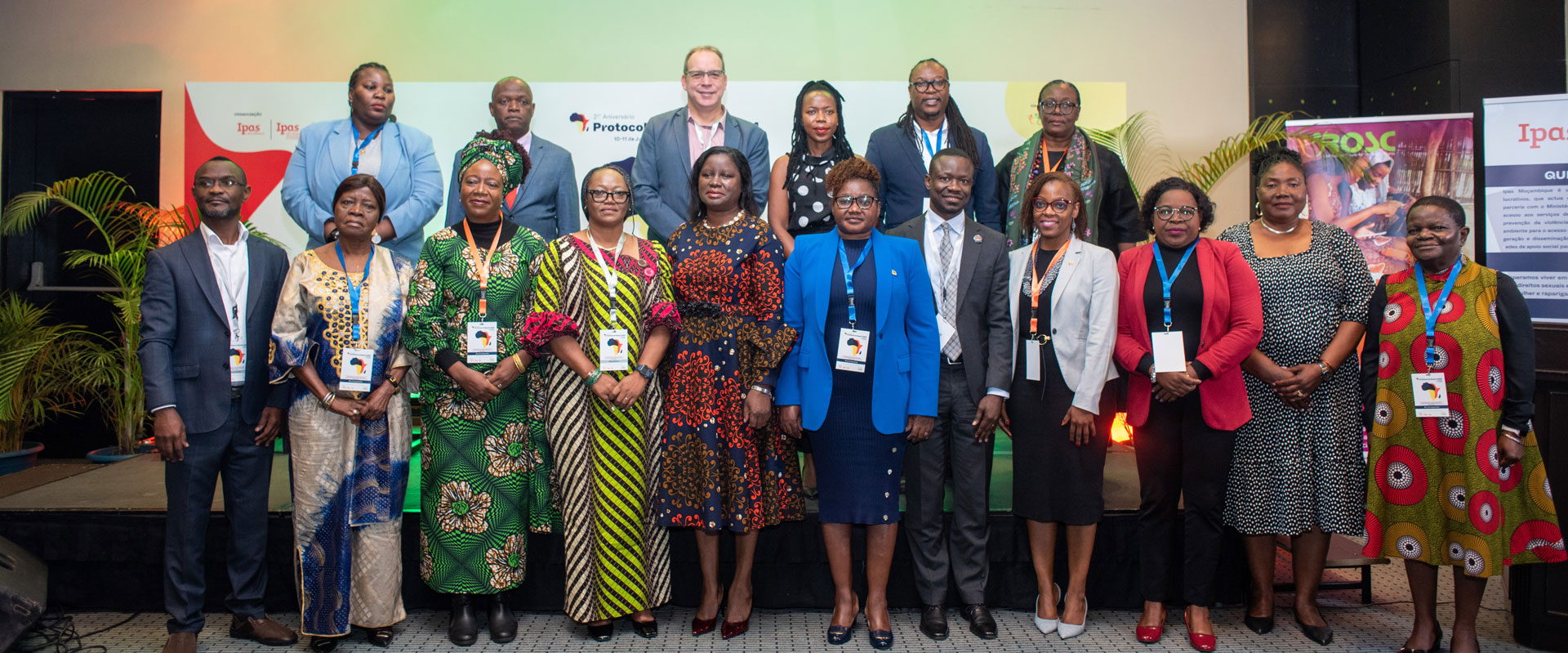Event highlights the importance of collective action to fulfill the protocol’s promise of reproductive rights that include abortion access
Marking the 21st anniversary of the landmark Maputo Protocol, which guarantees extensive rights to African women and girls, Ipas hosted a two-day regional conference in Mozambique devoted to exploring the challenges and successes of implementing this fundamental treaty for gender equity.
“We were thrilled to host this conference in honor of the Maputo Protocol, a groundbreaking legal milestone that has been crucial in advancing women’s rights across Africa, including the essential right to safe and legal abortion,” says Jorge Matine, Country Director of Ipas Mozambique. “The passionate engagement by attendees in advancing and safeguarding abortion access across Southern Africa was truly inspiring. It’s a testament to the progress we’ve made and a powerful reminder that we must accelerate our efforts to ensure no woman or girl is left behind.”
Ipas Mozambique, Ipas Africa Southern Region and Ipas Democratic Republic of Congo hosted the convening on July 11-12 to highlight the importance of collective action by Ipas and its partners to address regional challenges to full implementation of the protocol.
Representatives from the Dutch, Swedish, Irish, German, and Canadian embassies in Mozambique were among the key stakeholders in attendance, alongside government officials, regional United Nations agencies, and civil society organizations from across the region.
Collective action and international collaboration
Richard Delate, from UNFPA, East and Southern Africa Regional Office, emphasized the comprehensive nature of the Maputo Protocol, which addresses key issues such as the elimination of discrimination against women, the right to dignity, and protection against gender-based violence. “These articles work together to reinforce women’s rights across Africa,” Delate said.
He also noted the challenges of cultural sensitivities and political instability, pointing to advocacy, technical support, and peer learning as crucial to overcome these barriers, concluding that “collective efforts and collaboration are key to realizing the full promise of the Maputo Protocol.”
Sara Nicholls, Canadian High Commissioner in Mozambique, highlighted Canada´s commitment to support African nations in implementing the Maputo Protocol’s principles and emphasized the importance of community-driven change. “While international support is valuable, real impact comes from communities finding innovative solutions,” Nicholls said. “Canada is committed to supporting women-led organizations to address local needs effectively.”
Planning to address key challenges
Conference attendees discussed legislation and policies that can promote women’s rights, gender equity and access to reproductive health services that include abortion. Attendees also strategized on how to overcome cultural, social, climate, humanitarian and economic challenges to full implementation of the protocol.
Luisa Fumo, Deputy Head of Cooperation and Programme Officer for Gender, SRHR and Social Protection, Embassy of Sweden, emphasized the increasing backlash against women’s rights driven by organized anti-rights movements—and the ongoing challenges faced by women and girls in conflict zones. For example, “despite Mozambique’s progressive legislation on abortion and gender-based violence, access remains limited, especially in rural areas,” Fumo said.
“An important thing about the Maputo Protocol is that is highlights many intersecting issues that can threaten women’s and girls’ reproductive health, such as adverse climate events, teenage pregnancy, school dropout and child marriage,” notes Pansi Pam Katenga, Ipas’s global director for development. “These issues demand a holistic approach if we are to ensure reproductive rights for young people, as called for by the protocol.”
The importance of government engagement
Representatives from the Democratic Republic of Congo (DRC), Malawi, Mozambique, Zambia and South Africa shared insights on their work related to the Maputo Protocol. They emphasized the crucial role members of parliament play in championing women’s sexual and reproductive health and rights.
For example, the Eastern and Southern Africa Parliamentary Caucus on Sexual Reproductive Health and Rights—an initiative launched this year by parliamentarians, Ipas and other partners—has been instrumental in Malawi in advancing the review of guidelines on treatment for complications of unsafe abortion (known as postabortion care). The caucus has also been crucial in raising awareness on the right to abortion in South Africa, and identifying members of parliament who can champion legislative changes to support the Maputo Protocol.
Continued advocacy helps ensure Maputo Protocol’s promise
The Maputo Protocol (officially known as the Protocol to the African Charter on Human and Peoples’ Rights on the Rights of Women in Africa), is the first pan-African treaty to expressly recognize abortion as a human right. The protocol has been implemented with great success in some countries that are signatories. Yet much work remains to educate government officials and other stakeholders on the fact that countries which have signed the protocol have a legal obligation to protect the reproductive rights of women—including through access to abortion care.
For example, in 2018 in the Democratic Republic of Congo (DRC), the protocol became the law of the land when it was published in the country’s legal gazette. “Ipas has focused its work in the DRC on domesticating this regional treaty, laying the groundwork for women and girls to access legal and safe abortion care,” says Dr. Jean-Claude Mulunda, director of Ipas DRC. “Although socio-political, economic, and security contexts remain volatile, and there is a rise of opposition in the region, there is much to celebrate, given DRC’s progress.”
For women in DRC, as in many parts of Africa, full implementation of the Maputo Protocol would mean “broken silence and shifting social norms around abortion, and access to accurate sexual and reproductive health information and services, including for self-managed abortion,” Mulunda says.



